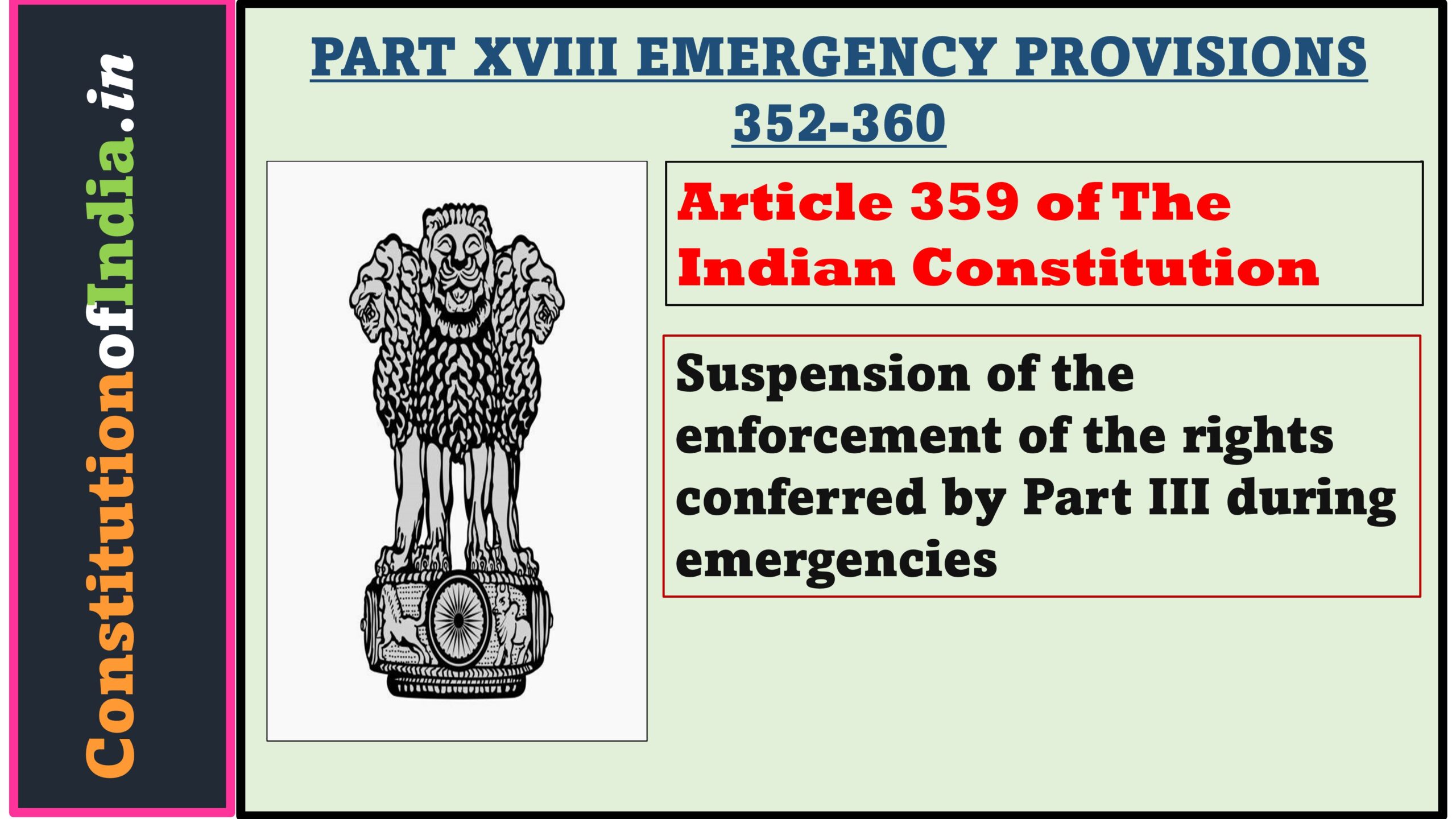Article 359 of Indian Constitution: Suspension of the enforcement of the rights conferred by Part III during emergencies.

Article 359 Suspension of the enforcement of the rights conferred by Part III during emergencies – Constitution Of India
(1) Where a Proclamation of Emergency is in operation, the President may by order declare that the right to move any court for the enforcement of such of 1 [the rights conferred by Part III (except articles 20 and 21)] as may be mentioned in the order and all proceedings pending in any court for the enforcement of the rights so mentioned shall remain suspended for the period during which the Proclamation is in force or for such shorter period as may be specified in the order. (1A) While an order made under clause (1) mentioning any of the rights conferred by Part III (except articles 20 and 21) is in operation, nothing in that Part conferring those rights shall restrict the power of the State as defined in the said Part to make any law or to take any executive action which the State would but for the provisions contained in that Part be competent to make or to take, but any law so made shall, to the extent of the incompetency, cease to have effect as soon as the order aforesaid ceases to operate, except as respects things done or omitted to be done before the law so ceases to have effect: Provided that where a Proclamation of Emergency is in operation only in any part of the territory of India, any such law may be made, or any such executive action may be taken, under this article in relation to or in any State or Union territory in which or in any part of which the Proclamation of Emergency is not in operation, if and in so far as the security of India or any part of the territory thereof is threatened by activities in or in relation to the part of the territory of India in which the Proclamation of Emergency is in operation. (1B) Nothing in clause (1A) shall apply— (b) to any executive action taken otherwise than under a law containing such a recital.]
(2) An order made as aforesaid may extend to the whole or any part of the territory of India: Provided that where a Proclamation of Emergency is in operation only in a part of the territory of India, any such order shall not extend to any other part of the territory of India unless the President, being satisfied that the security of India or any part of the territory thereof is threatened by activities in or in relation to the part of the territory of India in which the Proclamation of Emergency is in operation, considers such extension to be necessary.
(3) Every order made under clause (1) shall, as soon as may be after it is made, be laid before each House of Parliament. Article 359A Application of this Part to the State of Punjab.] Rep. by the Constitution (Sixty-third Amendment) Act, 1989, s. 3 (w.e.f. 6-1-1990).
Summary of Article 359 of Indian Constitution
- Article 359 of the Indian Constitution deals with emergencies.
- It grants the President the authority to suspend certain fundamental rights during emergencies, except for a few specified ones like Articles 20 and 21.
- Suspension means people can’t go to court to enforce those rights, and ongoing cases related to them are paused.
- The President decides which rights to suspend and for how long.
- While these rights are suspended, the government gains special powers to take actions it normally couldn’t.
- Once the emergency ends, any laws made during that time that contradict the suspended rights become invalid.
- The President must inform Parliament about this decision, and it’s reviewed by both Houses.
- Article 359 ensures that during crises, the government can take necessary steps, but also ensures citizens’ rights are protected and that these measures are temporary.
Explanation of Article 359 of Indian Constitution using Example
During a hypothetical national emergency due to widespread civil unrest, the President invokes Article 359 of the Indian Constitution to suspend certain fundamental rights, like the freedom of speech and movement, temporarily. This means people can’t exercise these rights, and legal cases pertaining to them are paused. With these rights suspended, the government gains powers to enforce curfews, conduct searches without warrants, and detain individuals without trial to restore order. The President must inform Parliament about this decision, which is subject to parliamentary review. Once the emergency ends, the suspension of rights is lifted, and any laws or actions taken during this period that contradict the suspended rights cease to be valid.